In Part 1 we presented the little known secret of New Zealand’s status as a tax-haven for the exceptionally wealthy and corrupt. It would seem unfathomable that such a simple loophole provides a tax free and completely anonymous investment vehicle, which is available to every corrupt official and criminal in the world. Let’s not forget either that New Zealand is a member of the Five Eyes intelligence alliance, which potentially adds another layer of complexity to this bizarre situation.
https://truthtrench.org/?p=3749
The full scale of global financial fraud really came into public view with the release of the Pandora Papers by the International Consortium of Investigative Journalists (ICIJ) beginning on 3 October 2021:
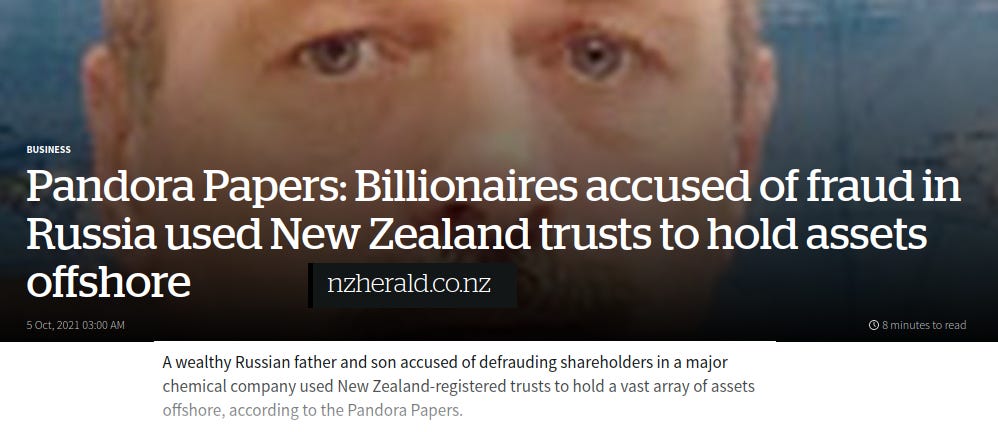
In total, 35 current and former national leaders appear in the leak, alongside 400 public officials from nearly 100 countries and more than 100 billionaires. The list includes royals, Kings, Presidents and Prime Ministers.
The international phenomena of Trusts and tax havens had become serious news. In this Part we will focus on the origins and evolution of the of New Zealand trusts which we have learned may be as favorable as any on earth. It all began roughly a decade after WWII:
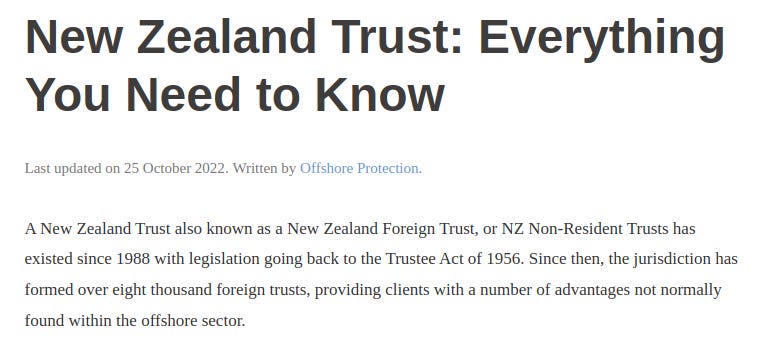
When the legislation was passed in 1956, there was a man on the scene who immediately seized the opportunity, and began to build an enormous fortune at the same time. This is where the New Zealand story becomes even more interesting.
Frank ‘the Bank’
Sir Francis Renouf, or Frank ‘the Bank’ Renouf, rapidly rose to notoriety within the British Commonwealth aristocratic elite:

His meteoric rise to celebrity financier allowed Frank to publicly enjoy all the finer things in life. He was married three times, but it was his final bride, an ex-model by the name “Lady Michele”, who provides us with a fascinating insight into the real life of Frank the Bank.
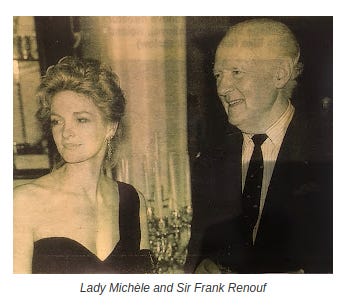
The Holocaust Denier
When it comes to publicly questioning the Holocaust, German authorities do not mess around. No matter your circumstances, you will be prosecuted to the full extent of the law and even imprisoned, given the opportunity:

Frank Renouf died in 1998, but Lady Michele Renouf kept her name and title and continued to live the high-life of a socialite. However, in 2018, she found herself in ‘hot water’ in Germany over her beliefs about what may have happened at that infamous point in German history:

The Dresden authorities did not hold back. They charged Lady Renouf and intended to prosecute her with all their powers. However, unlike the 93-year old “Nazi-Grandma”, the ex-model did not suffer the same fate. In fact, in a bizarrely uncharacteristic move for German authorities, all charges were dropped, without explanation, after nearly three years of legal battles.
After the case was dropped, the saga did not simply close and fade into history. Lady Renouf decided to reveal the reason she believes her case was dismissed:

That British spy was from one of the most prominent Prussian banking houses and largest private bank in Germany at the time. His name was Robi Mendelssohn.

The Mendelssohn family were renown over the centuries for their various family members excelling in philosophy, music, and banking. The founding patron of the family is considered to be Moses Mendelssohn. However, perhaps the most important thing about the Mendelssohn family is that they were exempted from all Jewish persecution in Prussia. This exemption was offered by none other than Frederick the Great:

Another Jewish family which received the favor of Frederick the Great were the Itzigs:
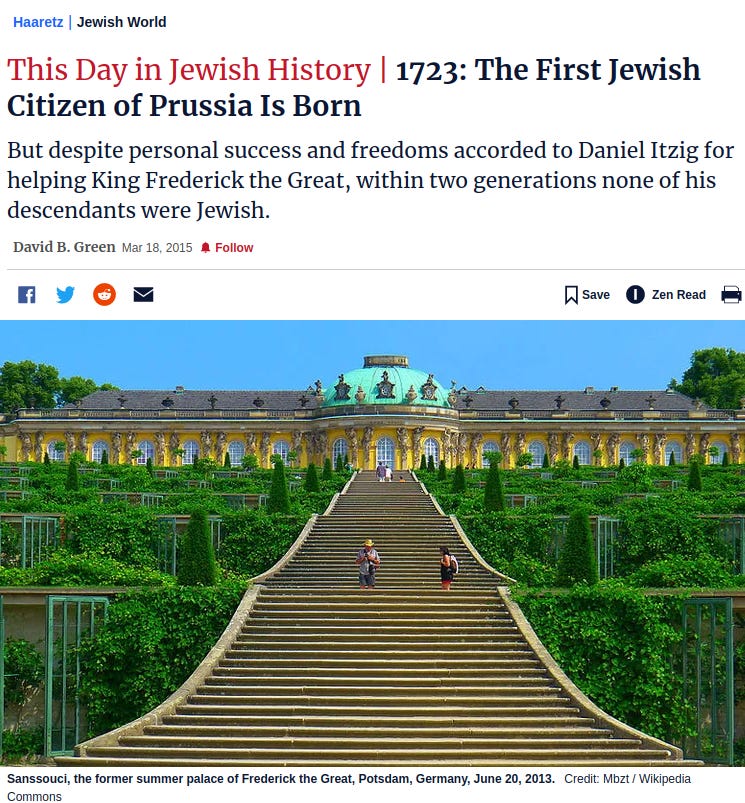
From the moment that these families were connected to Frederick the Great, the Mendelssohn and Itzig families became intertwined. The banking expertise of the Itzigs was critical to Frederick the Great’s military successes. This was at a time before the Rothschild family had even begun their foray into banking. The Mendelssohns and Itzigs solidified their banking skills to become one of the most powerful banking dynasties of the 19th and early 20th centuries.
Also remember that Frederick the Great’s most prized network was espionage. Frederick had placed spies into every corner of the 18th century world. With the Itzigs and Mendelssohns spending so much time at the Prussian court, and receiving numerous privileges from Frederick, it would only be fitting that they would, at some point, have to repay the favor. Their access to Europe’s banking elite was unparalleled, and Frederick would definitely not hesitate in using them to gather intelligence from within that realm.
Nearly two centuries later, amidst the chaos and brutality of WWII, Robi Mendelssohn appears to be continuing the great family tradition of banking and espionage. Robi was about to lose an immense fortune at the hands of the Nazis. It is throughout this time that Lady Michele Renouf claims that Robi Mendelssohn was acting in Germany as a British spy.
What was the motivation for him to do this? What became of Robi Mendelssohn during and after WWII? What happened to the vast Mendelssohn fortune?
To answer these enquiries, we must return to the extraordinary story presented by Lady Renouf.
The Rise of Hermann
In 1935, Robi Mendelssohn’s father died and he became head of the family and their banking operations. However, the Mendelssohn Bank was labelled a Jewish firm and therefore the Nazis required the business to become “Aryanized”. Robi understood exactly where this was going. Rather than fight the Nazis, he decided to negotiate with them and seek fair compensation for the 150+ year banking firm.
The man the Nazis chose to head up these negotiations was the Berlin manager of Deutsche Bank; Hermann Abs. In 1938, Deutsche Bank took over Mendelssohn & Co. Jewish employees were immediately fired, and anything that was left inside Mendelssohn & Co. was liquidated.
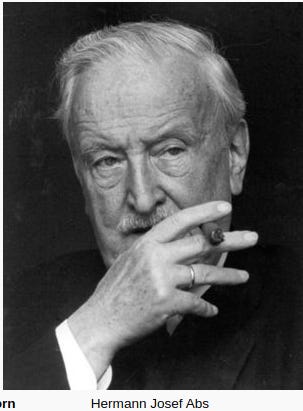
Hermann Abs was the most powerful commercial banker in Nazi Germany. The Reich continued to confiscate businesses in order to “Aryanize” them, and Abs was heading up this entire process; even holding directorships in these powerful companies:
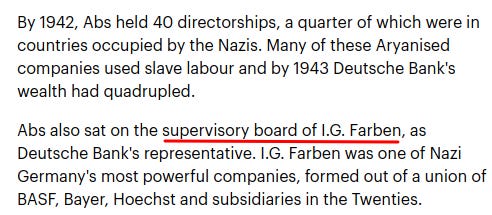
Recall in ReichsWEF – Part III that many IG Farben directors and employees were arrested and tried at Nuremberg. Twelve were found guilty of war crimes. Initially, Hermann Abs was among those arrested for suspected war crimes:
https://truthtrench.org/?p=3677
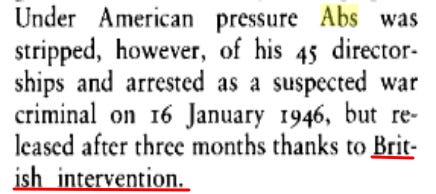
(from “Who’s Who in Nazi Germany)
Why on earth were the British intervening in the trial of Hermann Abs? According to Lady Michele Renouf, it was Robi Mendelssohn who came to his aid:
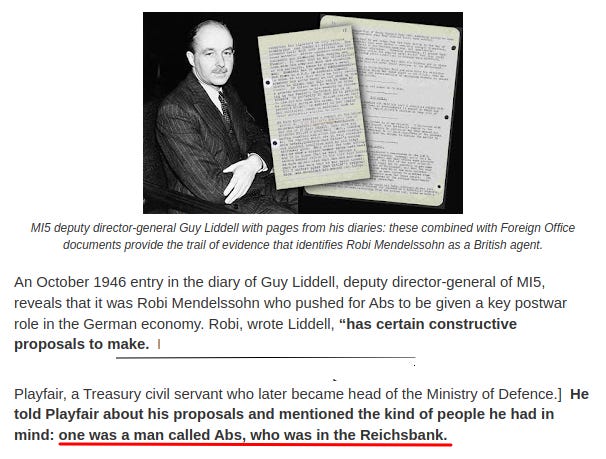
Consider the claims made by Lady Renouf and cross-reference them with the fact that Hermann Abs was released from facing a war crimes tribunal due to “British intervention”. Also consider that the British intervention was based on a recommendation from Robi Mendelssohn, a man who had his multi-generational banking dynasty ended by Hermann Abs.
None of this story seems remotely conceivable, unless we continue to follow the money.
Hermann and the Marshall Plan
Once the British, under the alleged recommendation of Robi Mendelssohn, freed Hermann Abs from Nuremberg prosecution, he was immediately put to work. He became an advisor to the first post-war German Chancellor, Konrad Adenauer. With Germany and most of Europe in a state of complete destruction, US Secretary of State, George C. Marshall presented the concept of rebuilding Europe in order to prevent the free-market capitalist system from breaking down. This became known as the Marshall Plan.
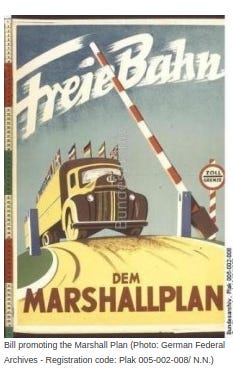
From 1948, the next four years saw $13 billion of economic aid provided to select European nations. The man appointed to oversee the allocation of these funds was Hermann Abs.
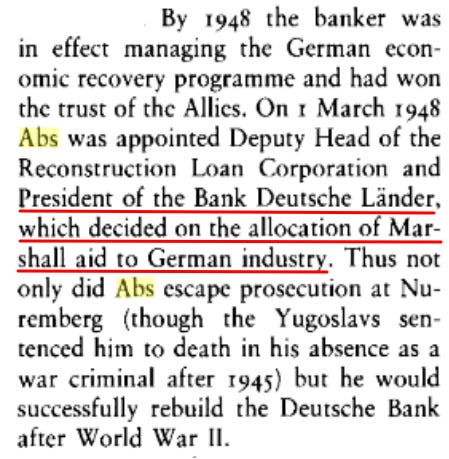
(from “Who’s Who in Nazi Germany”)
Abs was instrumental in the rebuilding of the West German economy. It was known as an “economic miracle”. His global contacts in banking served West Germany well. During the restructuring process, he used his London connections to settle West Germany’s foreign debts, which were the foundations for the future of German economic development. He was known as one of the greatest bankers of his day, and in many respects the West German economy prospered greatly from what he had accomplished.
However, one may be asking what all this has to do with New Zealand. What on earth could this have to do with Lady Michele and her late husband Frank “the Bank” Renouf?
Lady Michele Renouf claims that she presented all this evidence to the Dresden prosecutors who were seeking to imprison her for her Holocaust remarks in 2018. She claims that when this evidence was presented, the authorities immediately dropped their case against her. It is uncertain exactly why the authorities would do this unless there was something that they did not wish to become part of the public record.
Where did Lady Renouf receive this evidence involving Robi Mendelssohn and Hermann Abs? She received it from her late husband, Sir Frank Renouf. You see, Frank Renouf was very close friends with Hermann Abs:
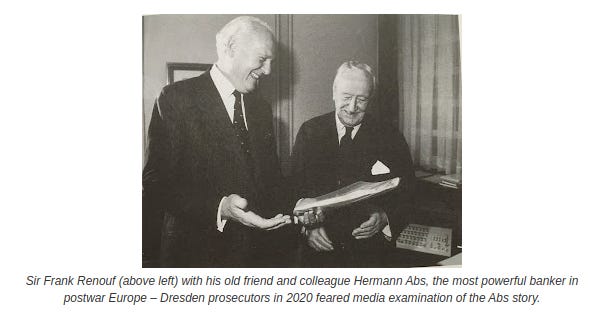
How did a New Zealand businessman come to be in Germany?:
“During World War II, Renouf served as a captain in the 2nd New Zealand Expeditionary Force, but captured in Greece in April 1941, and spent four years as a prisoner of war in Germany (Biberach, Warburg, Eichstatt).”
This is an incredibly interesting development because it shows that Renouf spent over four years in Nazi Germany – as a prisoner of war! If he was able to set up any contacts in Europe, this would be the time to do it. However, it seems almost impossible that he would have been able to establish any kind of commercial network while being incarcerated as a POW.
The question then arises: How did Frank Renouf and Hermann Abs become such close friends?


And so, we have a young New Zealand man, who was captured at the age of 21, who spent four years in a German POW camp, and then emerged from WWII working with Hermann Abs to introduce investment banking to West Germany.
According to Lady Michele, her husband worked with Abs during the German economic restructure; at the same time that the ‘Marshall Plan’ funds from American taxpayers were being allocated by Hermann Abs. For his services to Germany, ‘Frank the Bank’ received the highest German honor – the Verdienstkreuz. Once you understand the way that the Prussian regime works, it becomes clearer that these business relationships are not accidental; they appear to be deliberate appointments with clear missions.
After this, Frank Renouf returned to New Zealand and founded the nation’s first merchant bank. Using the new Trust laws that had been established in New Zealand, Frank was the man who introduced unit trusts to the country, and then rapidly became one of the wealthiest men in the British Commonwealth.
Given what we now know about New Zealand trusts, coupled with the immense amount of money that was flowing into Europe during the 1950s, one might wonder how Frank Renouf amassed such an incredible fortune from the tiny South Pacific island. For context, New Zealand is a place where sheep outnumber humans by nearly 8 to 1. In the 1950s, it was hardly a place for one of the world’s financial high-flyers to base his investment activities; unless there was a loophole that was somehow attracting global capital.
Regardless, Sir Frank Renouf’s wealth is now simply part of the historical record, as is the recent narrative provided by his third wife, Lady Michele. We may never know where or how his fortune was made, however the story does not end there. New Zealand’s rise to become one of the most secretive tax-havens had only just begun.
With Hermann Abs coordinating the economic rebuild of Germany, Deutsche Bank was reopened in 1957. He joined the managing board of directors, before eventually becoming the bank’s chairman. He also served on the board of several other major German corporations, and had a complete overview of the German economy. From such a prestigious position, there was serious money to be made.
Lockheed, Lufthansa and Bernhard
Recall in the ReichsWEF series we outlined the formation of the Bilderberg Group, which was co-founded in the Netherlands by Prince Bernhard. Recall the numerous scandals that plagued Prince Bernhard. During the 1930s, Bernhard was a member of the Nazi Party and he joined the Reiter SS Corps. He then went on to work for IG Farben.
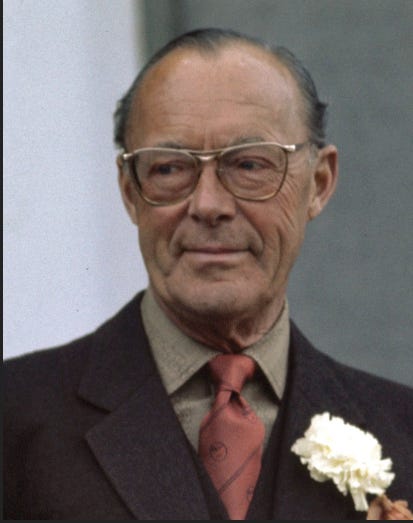
One of the biggest scandals that rocked Bernhard was in the 1970s:
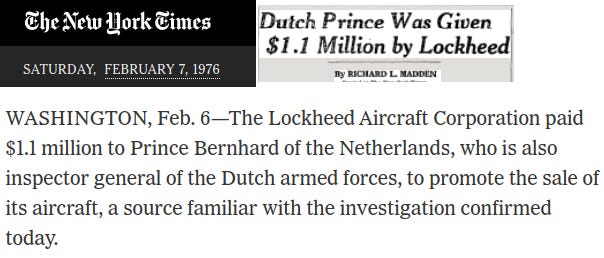
The Lockheed Affair was exposed during an investigation by the US Senate subcommittee, chaired by Senator Frank Church. This would later be termed the “Church Committee”; something that today’s House Republicans are pushing to replicate. Isn’t it interesting how history often rhymes?
However, the Lockheed investigation did not stop at Prince Bernhard. As previously stated, Bernhard was a proud co-founder and attendee of the Bilderberg group. One of the men who also attended several times during the 1950s and 60s, was none other than Hermann Abs. It appears he too was caught up in the Lockheed affair.
The following record is from a declassified 1975 Senate Foreign Relations Committee regarding “Arms Sales in Germany”:
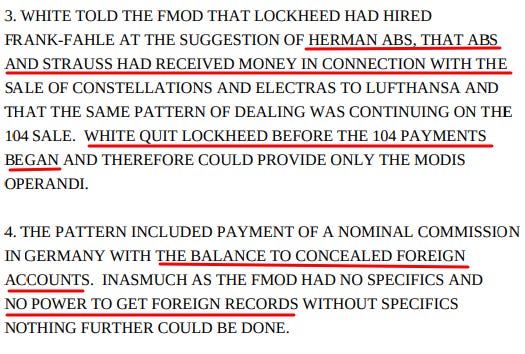
Where were these “concealed foreign accounts”? Why did the US have “no power to get foreign records”?
We can never be certain, but when we look at the strange and profitable relationship between Hermann Abs and Frank ‘the Bank’ Renouf, it is not out of the question that foreign funds could have been housed and concealed in New Zealand.
Whatever the truth, the 1975 confidential memo regarding concealed payments made to Hermann Abs was finally declassified by the US Department of State in 2006, over 30 years later.
Within the context of global business and finance, it is appropriate to pause and consider the enormous power Hermann Abs wielded during his career:
- He oversaw the “Aryanization” of Jewish owned assets during Nazi Germany, and held directorships in the most important German corporations of the day, including IG Farben.
- He oversaw the allocation of funds from the Marshall plan during the West German rebuilding period.
- He headed up one of the world’s largest post-WWII banks – Deutsche Bank, and oversaw the movement of significant foreign funds all over the world.
When it was revealed that Hermann Abs was receiving secret payments from Lockheed, it potentially exposed a much deeper layer of corruption at hand. If Abs did this with Lockheed, what other payments had he received? When you consider Abs’ corruption and the enormous amount of Marshall Plan funds that the American taxpayer had empowered him to allocate, an ominous picture emerges. If some of the Marshall Plan funds were diverted by Abs, it would be easy to ‘conceal’ them, especially with his good friend Frank ‘The Bank’ operating his merchant bank and trusts out of New Zealand.
If corrupt money was housed and concealed in New Zealand, it would most certainly explain the relationship Hermann Abs had with Frank Renouf, and why Renouf was nicknamed ‘The Bank’. It would also explain why Frank Renouf amassed a fortune from a tiny island that is better known for its disproportionate number of sheep and expeditions to Antarctica, than as a banking and high-finance mecca.
What the Church Committee release possibly shows us, is that Abs was not just rebuilding Germany, he was a key player in the Prussian transition into a network of globalist corporations and banking structures. An invisible enemy must have invisible networks within which to operate.
However, this story does not end here. We will now look to another of Hermann’s very close friends, and the rise of a financial market that would change the world forever.
It should come as no surprise that we discover yet another Prussian at play.
To be continued…
https://www.offshore-protection.com/new-zealand-trusts-formations
https://en.wikipedia.org/wiki/Frank_Renouf
https://modeltrial.blogspot.com/
https://www.dw.com/en/germany-93-year-old-holocaust-denier-sent-back-to-jail/a-61336650
https://www.timesofisrael.com/british-woman-probed-for-denying-holocaust-at-german-rally/
https://modeltrial.blogspot.com/
ibid
https://www.britannica.com/biography/Moses-Mendelssohn
https://modeltrial.blogspot.com/
https://www.britannica.com/event/Marshall-Plan
https://modeltrial.blogspot.com/
https://en.wikipedia.org/wiki/Frank_Renouf#cite_note-HBTQ-1
https://modeltrial.blogspot.com/
https://dictionary.reverso.net/german-english/Verdienstkreuz
https://www.britannica.com/biography/Bernhard-prince-of-the-Netherlands-prince-of-Lippe-Biesterfeld
